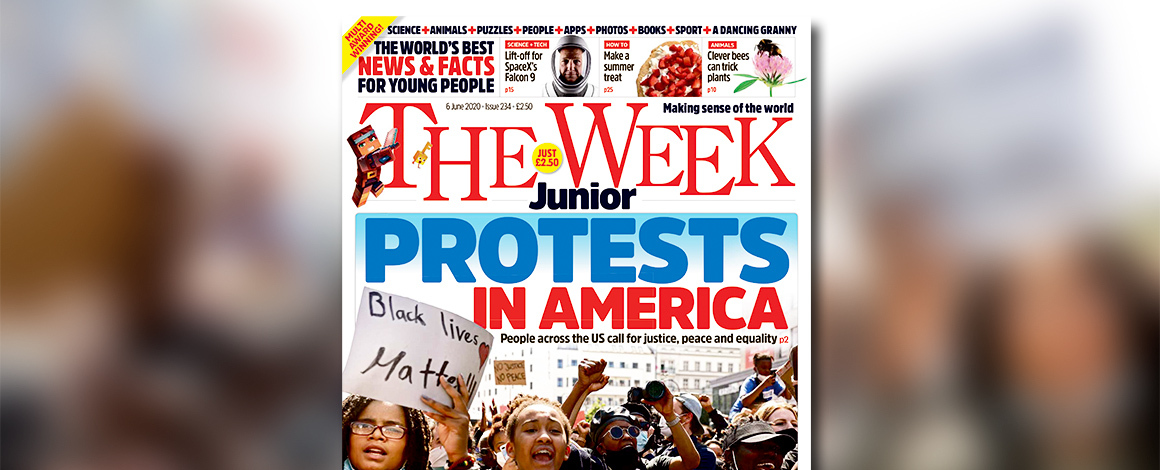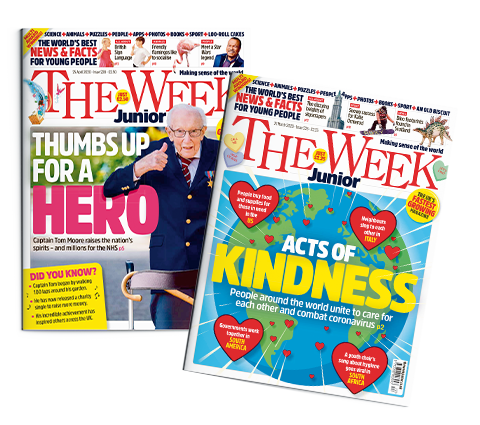
This week’s issue of The Week Junior includes a report on the death of George Floyd and the protests that have followed. It is also the subject of our front cover.
The footage of Floyd’s death and of the protests – some violent – are hard to avoid. Although we have been extremely careful in our choices of words and pictures for our report, children may find it upsetting and are likely to have some questions about what they have read, seen and heard.
Here are a few tips to help you do this, from Editor-in-chief, Anna Bassi:
- Acknowledge how they are feeling. It’s important to acknowledge your child’s feelings and give them the time and space to express them. Feeling angry, sad, and worried is normal, and letting children talk about their response to these events will help them to process their emotions. You can tell them that you feel upset too and so do a lot of other people. If a child finds it difficult to explain how they’re feeling then you could suggest writing or drawing instead. If they feel angry, taking some exercise can help.
- Don’t avoid difficult questions. Children need to know that they are taken seriously so it’s important to address their questions honestly and sensitively. You can say that although it is sometimes difficult to talk about events like this, it is vital that people do and that you will do your best to tell them what they need to know. If there is a question that you do not know the answer to, explain that it is a complex situation and that there aren’t always easy answers or simple solutions, but that there are a lot of people who are working to stop the same thing happening again.
- Provide some context. Help them to understand why people are so angry by talking about race and racism. Explain that racism is treating a person badly or unfairly because of the colour of their skin, culture or country of birth. There are lots of good books for children about race and racism, including What is race? Who are racists? Why does skin colour matter? And other big questions. by Claire Heuchan and Nikesh Shukla. The charity Childline has information for children about racism and racial bullying on their website, as well as advice for anyone who has been treated badly because of their race.
- Remind them that most police officers do not do bad things. Make sure that they know that the police officer in this case has been sacked, arrested and faces punishment. They should be reassured that the majority of police officers take their duty to protect the public very seriously and are committed to stamping out racism. Here in the UK, the National Police Chief’s Council made a statement saying “We will tackle bias, racism or discrimination wherever we find it."
- Explain that protests can lead to positive change and that, despite what they may have seen on the news, most protests are peaceful. Protests are an important way for people to make their voices heard and to draw attention to wrongdoing and injustice. There are plenty of examples of protests – including the Civil Rights Movement in the US during the 1950s and 1960s – that have led to positive change. Today, there are many people in the US and around the world who are working to bring an end to racism and inequality and these protests will help that to happen.
- Tell them that they can play a part. In situations like this, it is easy for a child to feel powerless so make sure they know that their voice matters too. Encourage children to stand up for anyone who they think has been treated badly because of their race and tell them to speak up if they experience or witness injustice.
We hope you find this helpful. We have also created some tips especially for young people. They can be found at theweekjunior.co.uk/TWJ-Protests
You can read the report in this week’s issue here

Every issue of The Week Junior aims to help children make sense of the world. We cover the most important events and news stories in the magazine every week, and we promise to do so carefully, responsibly and in a way that our young readers can easily digest and understand. We are proud to bring young readers intelligent, entertaining and balanced content and we thank you for trusting us to do this and hope that our magazine is helping them to stay informed and positive throughout difficult times.
If you don't already subscribe, you can try your first 6 issues for free - there’s never been a more relevant time for children to become part of The Week Junior community.
